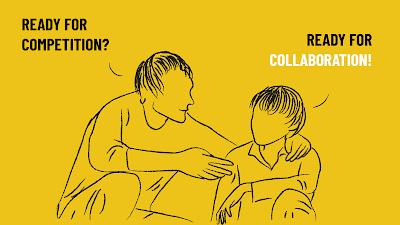It’s uncompete, not incomplete or noncompete
Please meet Ruchika Tulshyan. She is the founder of Candour, an inclusion strategy practice. Furthermore, she’s the author of a book titled “Inclusion on Purpose: An Intersectional Approach to Creating a Culture of Belonging at Work." Recently, she is working on her next book, “Uncompete: Dismantling a Competition Mindset to Unlock Liberation, Opportunity, and Peace."
Either myself or you were both correct. I did not mistype, and you did not misread. Uncompete, it is. You will be unable to find this word in any type of dictionary. “It is a new word, by me,” said Ruchika. Basically, “un” is a prefix meaning "not." According to dictionary.com, this prefix is freely used as an English formative, giving negative or opposite force in adjectives and their derivative adverbs and nouns, such as unfair, unfelt, unseen, unheard, unformed, and so on.
Uncompete, Ruchika added, is, in a nutshell, a state of not competing with each other. Competition is in all of our layers of life: work setting, school life, family circle, etc. However, in my opinion, many individuals can relate to the importance of not always competing with each other. Psychologs, the first Indian mental health magazine, stated that many people would consider how to undermine the performance of others rather than how they could achieve their own objectives. Ultimately, it causes stress, envy, and anxiety. On the contrary, research by DiMenichi and Tricomi (2015) discovered that competition can have strong effects on attention and memory, in particular in real-world contexts that involve social interaction.
 |
| Photo credit to beyond8.in |
In my experience, I felt how hard the competition was when I was an elementary school student. It’s around 2005–2006. I remember vividly a moment when I felt so scared because I was unable to finish my homework. I am not sure what the project was about; all I remember is that feeling. I was terrified; I had always been one of the best; I wanted to maintain my ranking—I was in the top 5. The competition was intense, and it sticks in my mind to this day.
However, I wholeheartedly agree with Ruchika's uncompete idea. This principle could be applied not only in a school setting but also in real-world settings that involve social interactions. Nevertheless, another important point to be able to fully execute the uncompete setting is being able to have an inclusive mindset. In her Inclusion on Purpose book, Ruchika stated five steps to cultivate an inclusion mindset (Ruchika, 2022:42). She mentions it as a BRIDGE framework. They are: (1) Be uncomfortable; (2) Reflect on what you do not know; (3) Invite feedback; (4) Defensiveness does not help; (5) Grow from your mistakes; and (5) Expect that changes take time. Reflect on those five steps; I would say that “reflect on what you do not know” is the hardest one. A few years ago, I acquired Indonesian sign language. It was delightful; I had the opportunity to engage with members of the deaf community whom I had never met before.
 |
| Photo credit to mrslaurafaulkner.wordpress.com |
At one moment, during one of our breaks, I was sitting with some deaf people. Two of them were communicating in sign language. I watched at them while having my snack and thought, "Oh gosh. This is how you feel when you are unable to fully understand a dialogue." That moment surely has slapped me to realize that (1) everyone has their own disability in various circumstances, and (2) accessibility matters. One tangible thing that changed me until today is that I realize how important the subtitle and sign-language interpreter are for the deaf. When it comes to producing videos, I always at least include subtitles to provide inclusive access for everyone. On top of that, when talking about cultivating an inclusion mindset, I think that was a simple yet genuine instance of the learning process for cultivating the mindset.
Furthermore, when it comes to bringing up a wider context, such as an organization, in my opinion, an incredible leader is someone who creates an inclusive ecosystem for the organization. And how do you make it happen? Well, we can get back to the thesis of this writing. A leader should set the work environment as collaborative, where anyone has their spot to voice their idea, involve multiple individuals from various groups with balancing gender formation, and also embrace difference as a pathway to growth.
In summary, the value of not competing—or to uncompete like Ruchika said—not only opens a chance to cultivate inclusion in organizations but also can contribute to an inclusive society. It resonates with a prominent quote of Lao Tzu: “The journey of a thousand miles begins with one step."



Komentar
Posting Komentar